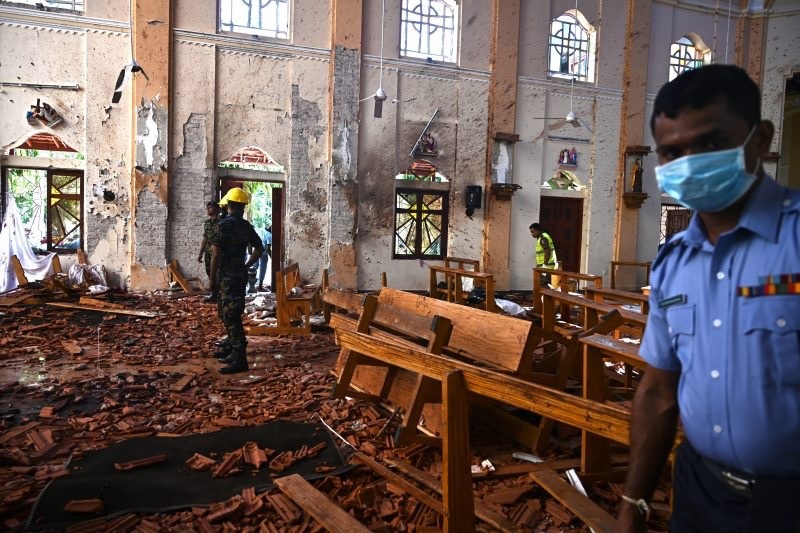Decoding Sri Lankan Easter Bombings: “War on Terror Chapter 2,” Need of the Hour
Sri Lanka blames Islamists for Easter attacks as death toll hits 290. (AFP)
Even as the world community is still trying to come to grips with the death and despair of April 21 Easter bombings that killed 256 people and injured 500 more, in four hotels and three churches in Sri Lanka, intelligence from the United States of America has warned of elevated terrorist threat in the Island nation due to many active members of terror outfit, National Thowheed Jamaath (NTJ), carrying out suicide bombings still on the prowl, writes Priyanka Bhardwaj.
Conveying this information to press persons and more importantly to the Sri Lankan government was the U.S. Ambassador to Colombo Alaina Teplitz, who also acknowledged the efforts of Lankan police, tri forces, intelligence and law enforcement agencies in apprehending a large number of suspects, and embarking on preventive measures, such as a ban on wearing veils or ‘burkha’ by Muslim women, on an active mode, and intensification of vigilance, besides their successful cooperation with the on ground FBI team from the U.S.
The Lankan President Maithripala Sirisena has also stated that in consonance with the eradication of terror the country is pursuing immediate revision of terrorism laws.
It is no more conjecture that for the debt laden Sri Lankan economy that forced its government to cede control of its strategically located Hambantota Port in the Indian Ocean to China, due to its inability to pay off the huge infrastructure loans forwarded by Beijing, was the target of the terror strike.
The attacks were in fact a means to weaken Lankan tourism industry that is the largest source of revenue earning of the country.
Since the end of the LTTE led civil wars, between the Sinhalese majority and the Tamil minority, in the 2009, the island nation had been relatively peaceful.
But with the occurrence of these attacks it is being widely believed as perhaps the beginning of another chapter of bloodshed if roots of this terror scourge are not completely neutralized.
Sociologists have identified an underlying tension between the Buddhist Sinhalese and Muslim minority (concentrated largely in the eastern part of the island), and the latter being egged by Saudi funding and Wahhabi preaching to aggravate fundamentalism and militancy that need immediate redressal as much as the breaking up of the linkages between the Lankan NTJ and Tamil Nadu Thoweed Jamath based in Tamil Nadu that provide sustenance to each other.
However, an important aspect of error that allowed the recent bombings was that the Lankan security apparatus unheeded clear warnings by the Indian intelligence that were dispatched even a few hours before the bombings, as admitted by Sirisena and collapse of communication with his Prime Minister Ranil Wickremesinghe, as also faulty assumption on the part of Sri Lankans, i.e. India’s intentions to one of fomenting ill will between Sri Lanka and Pakistan which ironically is an abettor of violent terrorists.
Though the Inspector General of Police was made to resign and the Defense Secretary put in his papers, that the intelligence failure was so huge that only a thorough investigation will throw light on all the responsible parties.
The Easter bombings reminded one of the 26/11 Mumbai attacks when 10 Pakistani militants were killed and apprehended after the longest sieges of the world.
In fact in terms of the death toll the Eastern Bombings are amongst the worst in the chronology of modern times and that these terrorists have been gaining a secure base and fresh recruits all over Asia, barring the Middle East, from the Maldives to Bangladesh, India, Myanmar and to the Philippine archipelagos aided by the passive authorities and growth of radical groups in the region is something that cannot be ignored any longer.
While analyzing the NTJ, one cannot establish a direct association with the core of the ISIS of Iraq or Syria but that the ideology at work is the same.
The Lankan attacks are only a reminder of the global insurgency faced since 1980s when the likes of Islamic State-linked jihadists began operating in an active way in spaces with weak regimes or none whatsoever and then spread their terror tentacles in other parts of the world such as the US, eastern Europe, Asia and Australia, while also replenishing their human resource wherever they went as also providing them with the necessary tradecraft and funds to unleash their battle honed skills picked up from war zones in their native lands or else training the grassroots jihadists.
It would be worthwhile to re-jog memories to times when a group of grassroots jihadists in New York, declared as incompetent by the FBI, had successfully attacked the World Trade Center, then different groups of returning jihadists had used their skills to launch dreadful attacks in Indonesia and in Australia, and more recently in Brussels, Paris and other countries of Europe.
The latest country to become a theatre of the jihadists’ attacks is Sri Lanka and to eradicate all chances of its growth the country needs not just self-willingness and pro-activeness in this fight against terror but also sustained international cooperation and for the U.S. to inaugurate its second chapter of “war on terror.”


